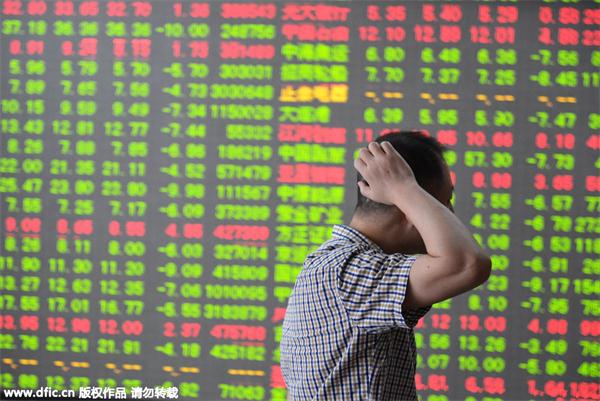Why single out China for market intervention?
Updated: 2015-07-17 08:39
By Kenneth S. Courtis(China Daily)
|
||||||||
 |
|
An investor at a brokerage house in Hangzhou,Zhejiang province. [Photo/IC] |
There has been a lot of talk recently about the Chinese government becoming involved in the country's stock market: An odd charge to level at China, to say the least. Just look at what takes place around the world. Indeed, it is in the so-called developed economies that we see the most frequent and most aggressive market intervention by governments.
The Bank of Japan is buying Exchange Traded Funds and real estate stocks on a large scale. Over the past year and a half, the BoJ has aggressively purchased the Nikkei index. These are operations that Japan's central bank has done regularly since the market implosion in 1989.
Also, the Japanese government has frequently instructed the national pension fund, the national social security fund and the postal savings fund, as well as private sector funds - such as the large insurance companies and the city banks - to do the same. The buying of ETFs and real estate stocks is part of the BoJ's quantitative easing program.
Besides, the Japanese central bank and other government investment pools are also buying into commercial real estate.
We have seen various government market operations in the Republic of Korea, Thailand, Malaysia and Singapore. Of course, 25 years ago, the Hong Kong Monetary Authority led the charge into the equity market, which speculators had pushed into a death spiral. So, as far as Asia is concerned, government intervention is neither new nor uncommon.
As for the rest of the world, one need only recall that former US secretary of the treasury Timothy Geithner, from 2009 till he resigned in 2013, never ceased to underscore that rising asset prices were a major objective of quantitative easing. While the US Federal Reserve was not directly buying equities, it was working assiduously to drive money into equity markets.
Remember also that US President Barack Obama, during a press conference in the spring of 2010, advised his fellow Americans - like Warren Buffet - that it was a good time to buy shares, emphasizing that the US government would do everything it could to support asset prices.
In October 1987, the BoJ aggressively bought US index futures during Asian trading hours - in Wall Street vernacular - to position the market for the opening, following the Oct 19 "Black Friday" crash on the New York exchange.
Later, it emerged that the operation was carried out at the request of the US Federal Reserve and Treasury. The two countries had apparently struck a swap deal over the weekend, so that the Japanese had all of the US dollars they needed for the operation.
In 2007 and 2008, France's institutional investor Caisse de Dép?t, on the instructions of the élysée Palace, where the chief of staff was the former head of the French Treasury, bought the French stock market index, as well as the underlying shares, in order to support the market that was crashing.
In the summer of 2007, the Bank of Canada became the only buyer in the asset-backed securities market that had imploded and risked wiping out the pension assets of millions of people.
There are several such examples, including the UK lifeboat operation in the 1970s. One also remembers that in 2001 and 2002, several European Union equity markets simply shut down for a few days at the peak of market turmoil.
Thus, what we are seeing today in China is not exceptional. Perhaps it is being done in a clumsier manner than in some other places, but it has been a common practice across the world.
China's stock exchanges are less than 20 years old. More mature economies have simply had more experience of market crashes. As a result, their governments have developed a larger panoply of instruments to intervene in the markets and have done so with greater finesse.
Kenneth S. Courtis is chairman of Starfort Holdings and managing partner of Courtis Global & Associates.
The Globalist
- Global health entering new era: WHO chief
- Brazil's planning minister steps aside after recordings revelation
- Vietnam, US adopt joint statement on advancing comprehensive partnership
- European border closures 'inhumane': UN refugee agency
- Japan's foreign minister calls A-bombings extremely regrettable
- Fukushima impact unprecedented for oceans: US expert

 Stars of Lijiang River: Elderly brothers with white beards
Stars of Lijiang River: Elderly brothers with white beards
 Wealthy Chinese children paying money to learn British manners
Wealthy Chinese children paying money to learn British manners
 Military-style wedding: Fighter jets, grooms in dashing uniforms
Military-style wedding: Fighter jets, grooms in dashing uniforms
 Striking photos around the world: May 16 - May 22
Striking photos around the world: May 16 - May 22
 Robots help elderly in nursing home in east China
Robots help elderly in nursing home in east China
 Hanging in the air: Chongqing holds rescue drill
Hanging in the air: Chongqing holds rescue drill
 2.1-ton tofu finishes in two hours in central China
2.1-ton tofu finishes in two hours in central China
 Six things you may not know about Grain Buds
Six things you may not know about Grain Buds
Most Viewed
Editor's Picks

|

|

|

|

|

|
Today's Top News
Liang avoids jail in shooting death
China's finance minister addresses ratings downgrade
Duke alumni visit Chinese Embassy
Marriott unlikely to top Anbang offer for Starwood: Observers
Chinese biopharma debuts on Nasdaq
What ends Jeb Bush's White House hopes
Investigation for Nicolas's campaign
Will US-ASEAN meeting be good for region?
US Weekly

|

|








